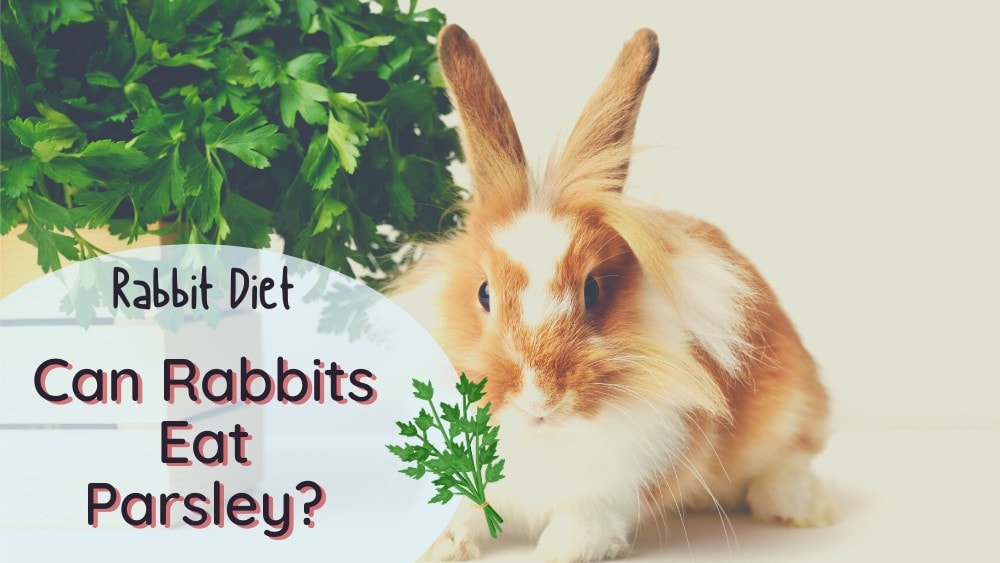Parsley is an aromatic and tasty herb that uniquely flavors and colors our culinary dishes. And for that reason, this herb is a staple in the kitchen. Aside from being just a usual garnishing, parsley is also packed with nutrients, making it healthy for humans.
Rabbit owners know that their furry pets love to nibble on tasty leafy greens, and they generally want their rabbits to enjoy green vegetables like parsley. But as a good rabbit owner, you must ensure that all vegetables are safe for your pet rabbit to eat. This leads us to ask, can rabbits eat parsley?
In this article, we will take a deep-dive into this topic, and discuss:
- Health benefits of parsley for rabbits
- How to feed rabbits parsley
- Risks associated with feeding rabbits parsley
- Some frequently asked questions (FAQs)
So settle down and grab a cup of coffee as we dive into the world of rabbits and parsley!
Can Rabbits Eat Parsley?
Yes, parsley is safe for rabbits but should be given in moderation. It is a healthy food that contains many vitamins and minerals, making it a great addition to a rabbit’s diet. However, feeding your rabbit too much parsley can cause several health problems, including gastrointestinal issues like bloating, diarrhea, and kidney stones.
Health Benefits of Parsley in a Rabbit’s Diet
Parsley is packed with a lot of nutritional value for both you and your furry friend. If you are trying for a healthy diet for your bunny, you should add parsley to its diet. We’ll give you the list of health benefits of feeding your rabbit parsley:
- Low sugar
Parsley contains less sugar than other vegetables like carrots and green beans. For example, a 100-gram serving of parsley contains only 0.85 grams of sugar. This makes parsley suitable for rabbits, as a healthy rabbit diet should be low in starch and sugars.
- Contains essential vitamins
Parsley contains some essential vitamins which are necessary to maintain optimum rabbit health. It contains vitamins C and E, which serve as antioxidants and are required to maintain the immune system. Parsley also contains vitamin K, which helps keep the integrity of bones in rabbits, as well as Vitamin A for good eyesight.
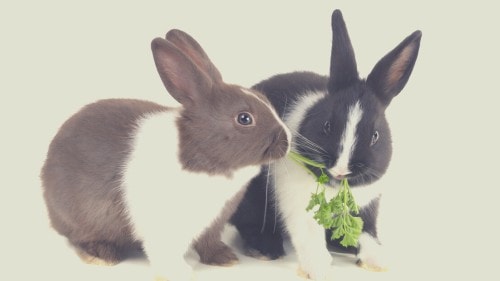
- Contains minerals
Parsley also contains minerals like calcium, phosphorus, sodium, iron, zinc, and magnesium. These play important roles in a rabbit’s health, including maintaining strong teeth and bones, accelerating and maintaining growth, and ensuring good respiratory and cardiovascular health in rabbits.
- Contains antioxidants
Parsley is also rich in antioxidants like lutein, a type of carotenoid or pigment that generally helps soothe inflammation and reduce irritation and oxidative damage to the skin. Additionally, antioxidants have been shown to minimize damage to internal organs in rabbits.
Parsley also contains carbs, proteins, fat and dietary fiber, all of which are necessary to maintain your rabbit’s health.
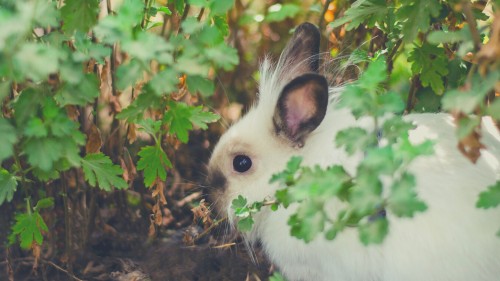
How to Feed Parsley to Rabbits
Now you know parsley is safe for your bunny. Next, you need to learn how much parsley to feed your bunny and how often you can do so. Below are pointers on how to safely feed rabbits parsley:
Step 1: Buy fresh parsley
When buying parsley, ensure you purchase fresh ones. It is better to purchase organic parsley as these are not used pesticides or herbicides, which may harm your bunny if ingested.
Step 2: Wash properly
Like other green vegetables, Parsley needs thorough washing before feeding your rabbit. This will help rid it of the dirt and chemicals which may harm your bunny.
Step 3: Know how much parsley to give
It is essential not to feed your rabbit too many leafy greens like parsley. Vegetables should make up only 10% of a rabbit’s diet.
Feeding your rabbit two stems of parsley with leaves no more than two to three times a week is recommended.
You can also mix parsley with other green vegetables for your bunny. However, remember that hay or grass should make up the bulk of a rabbit’s diet. Making a diet plan will ensure you’re not overfeeding your rabbit with foods not part of their proper diet.
Step 4: Observe carefully
If you decide to give your pet parsley, introduce it to your rabbit’s usual diet slowly. First, feed it a few leaves and observe its reaction for the next 24 hours. If it shows no strange symptoms, you can gradually increase the quantity of parsley you feed.
However, if your bunny shows symptoms like bloating or diarrhea, stop feeding it parsley immediately. Consult your veterinarian if your rabbit shows any abnormal signs after eating parsley.
Risks Associated with Feeding Rabbits Parsley
While parsley is safe to feed your rabbit, it is best to do so in moderation. An ideal rabbit diet should include adequate fresh water, 85% feeding hay or grass, 10% leafy greens, and 5% other healthy treats.
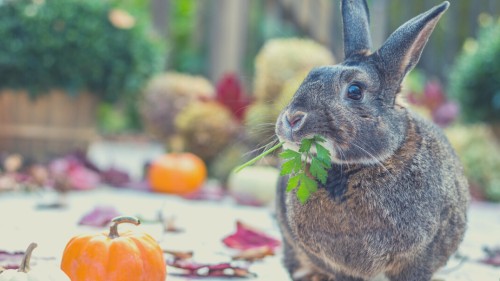
Feeding too much parsley can affect a rabbit’s health negatively. Here are some potential risks associated with feeding rabbit parsley.
Gastrointestinal issues
Rabbits have a sensitive digestive system. Introducing parsley or any other new food into your bunny’s diet may result in gastrointestinal issues like bloating, diarrhea, stomachache, and gastrointestinal (GI) stasis.
GI stasis is a life-threatening condition in which a rabbit’s digestive system either slows down or stops altogether. It can result in severe pain and death if left untreated.
Additionally, feeding too much parsley can upset a rabbit’s digestive system, resulting in gastrointestinal issues.
Kidney and bladder issues
While parsley falls under the umbrella of dark leafy greens, which are generally healthy, it does contain quite a lot of calcium, at around 140 mg per 100 g of fresh parsley. To put that in context, the same weight of raw carrot or cabbage contains 30-40 mg of calcium. However, parsley isn’t as high on the calcium scales as kale, which contains around 250 mg calcium per 100 g.
If a rabbit eats too much calcium, the mineral may accumulate in its urinary system, often resulting in kidney or bladder stones. Common symptoms of kidney or bladder issues in rabbits include thick or brown-colored urine and blood in the urine.
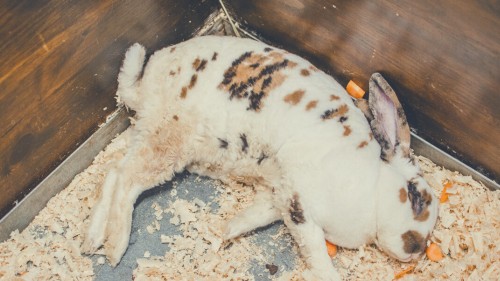
Owners should always keep an eye on their rabbits’ urine, and consult your veterinarian immediately if you notice abnormal symptoms or behavior. It’s also a good idea to space out your bunny’s high calcium treats, to avoid a build-up of minerals. So, if they had curly parsley today, your rabbits might have low-calcium carrots for their veggie portion tomorrow.
FAQs About Feeding a Rabbit Parsley
Can rabbits eat parsley stems?
Parsley stems are safe to feed to your bunny. In fact, most rabbits enjoy its juicy taste. However, wash the stems thoroughly to remove dirt, insecticides, and pesticides before offering them to your bunny.
Can a rabbit eat parsley roots?
Yes, rabbits can eat parsley roots. It is important to wash these properly before feeding them to your bunny.
Are parsley flowers safe for rabbits?
Yes, parsley flowers are safe for rabbits. Bunnies may eat all parts of the parsley plant. However, wash it properly to remove dirt or harmful chemicals before serving them to your bunny.
Can baby rabbits eat parsley?
No, baby rabbits should not be fed parsley as their delicate digestive systems cannot effectively digest leafy greens yet.
Baby rabbits should stick to their mother’s milk and the adult diet of pellets and fresh hay until they are one year old, after which you can gradually include leafy greens and fruit treats.
Are all types of parsley safe for rabbits?
You may not realize, but there are actually four different types of parsley:
- Curly-leaf parsley (also known as French parsley)
- Flat-leaf parsley (also called Italian parsley)
- Japanese parsley
- Hamburg parsley
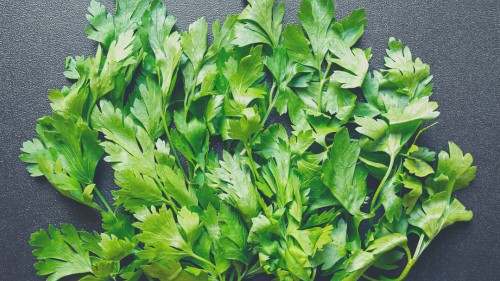
The good news is that the leaves of these plants are all equally safe to include in your rabbit’s balanced diet, provided you follow the guidelines noted above.
The Bottom Line on Feeding Parsley to Rabbits
Adult rabbits may safely eat parsley in moderation. It contains many nutrients that can boost your bunny’s immune system and help it stay healthy. You can feed your bunny any part of the parsley plant, including parsley leaves, stems, and flowers. However, letting your rabbit eat too much parsley can impact your rabbit’s organ health. It’s best to ensure that parsley and other leafy greens do not make up more than 10 % of your rabbit’s diet.
If you have enjoyed this article, share it with your fellow rabbit owners, and if you have more questions about your rabbit’s diet, feel free to leave them in the comments section below.


